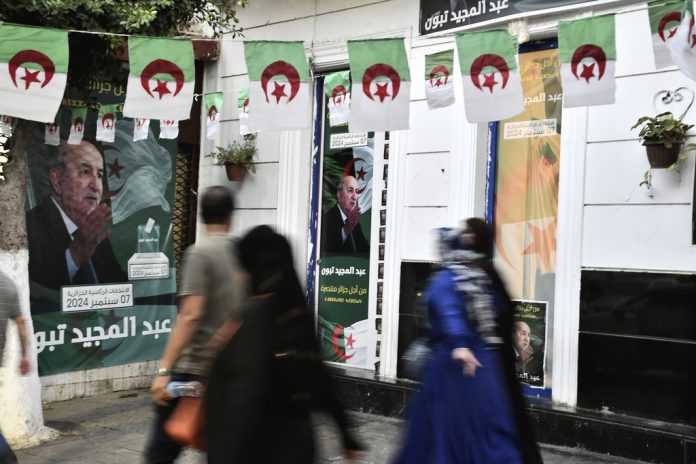ALGIERS, Algeria (AP) — The two opposition candidates who ran in Algeria’s presidential race legally challenged on Tuesday the provisional result while harshly rebuking election officials and disputing the vote count.
Islamist Abdellali Hassani Cherif and socialist Youcef Aouchiche filed appeals with Algeria’s Constitutional Court, taking the first step required to challenge the results of the election, which incumbent President Abdelmadjid Tebboune won with a 94.7% share of the vote.
Algerian law provides the court ten days from the announcement of provisional election results to rule on the appeals. A verdict could require the election authority to recalculate each candidate’s totals without calling into question Tebboune’s victory, for which he has already begun receiving congratulatory messages from Algeria’s foreign allies.
A day before lodging their appeals, both candidates took aim at Mohamed Charfi, the President of Algeria’s National Independent Electoral Authority (ANIE) for how the results of Saturday’s election were reported.
“President Tebboune didn’t need this stuffing. We knew he’d be re-elected, but with these results, ANIE hasn’t done him any favors,” Cherif said. “We want our votes — the votes of the people who voted for us — to be returned to us. I know it won’t change the outcome of the vote, but it will go down in history.”
Meanwhile, Aouchiche held a press conference where his campaign manager showed graphics that he said proved the results had been distorted and called the outcome a “shameful and gross manipulation.”
“These results, which do not correspond at all to the number of votes communicated to us by the regional delegations of the same ANIE, are a disgrace for the Algeria of 2024, taking us back to the 1970s,” he said, referencing a time when the country’s only legal political party ran its chosen candidate unopposed.
The two challengers have taken issue with discrepancies between the number of votes used to tally the results and the turnout figures that election officials published a day earlier. Late Sunday, Tebboune joined them in denouncing ANIE, aligning himself with popular anger that his challengers had drummed up against it.
In a shared statement, campaign managers for Tebboune, Aouchiche and Cherif called into question the results that ANIE had reported and how they didn’t correspond with the regional figures that local authorities had reported.
“We inform national public opinion that inaccuracies, contradictions, ambiguities and inconsistencies were noted in the figures when the provisional results of the presidential election were announced by the chairman of the National Independent Election Authority,” they wrote.
The unprecedented turn of events marks a departure for Algeria, where elections have historically been a carefully choreographed affair by the ruling elite and military apparatus that backs it.
ANIE, the election authority, was established in 2019 in response to demands from pro-democracy protests whose weekly demonstrations were convulsing Algeria. Replacing Algeria’s Interior Ministry, the independent body was designed to guarantee election integrity and transparency.
But its independence has been called into question, particularly after it reported Saturday that Tebboune had won with a larger share of the vote than Vladimir Putin in Russia’s March presidential election.
In local media, commentators speculated Tebboune’s decision to criticize the election authority after being announced the winner suggested a “clan war” among the shadowy ruling elite thought to run Algeria. Charfi, the top election official, was pilloried for acting as a “troublemaker” and having “discredited the election” in the regional daily newspaper the Republican East.
Five years after the pro-democracy “Hirak” movement brought about the ouster of Tebboune’s predecessor, for many Algerians the latest developments have shown how little has changed. Though the Hirak called for a boycott of the vote, its critiques of the system have been seen and heard after how the election played out, former Communications Minister Abdelaziz Rahabi said.
“What I feared and denounced has happened. The country has become ungovernable because of its failure to satisfy the Hirak’s key demands and the shuttering of political and media spheres,” he wrote on X.
Source: post





